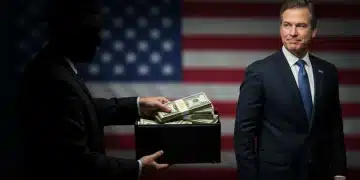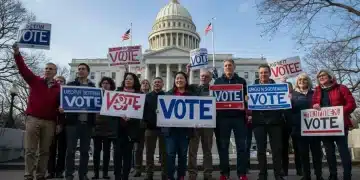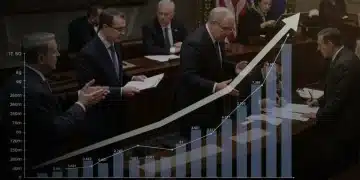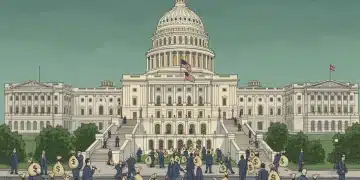Corporate Tax Hike & Campaign Finance Reform: What’s Next?
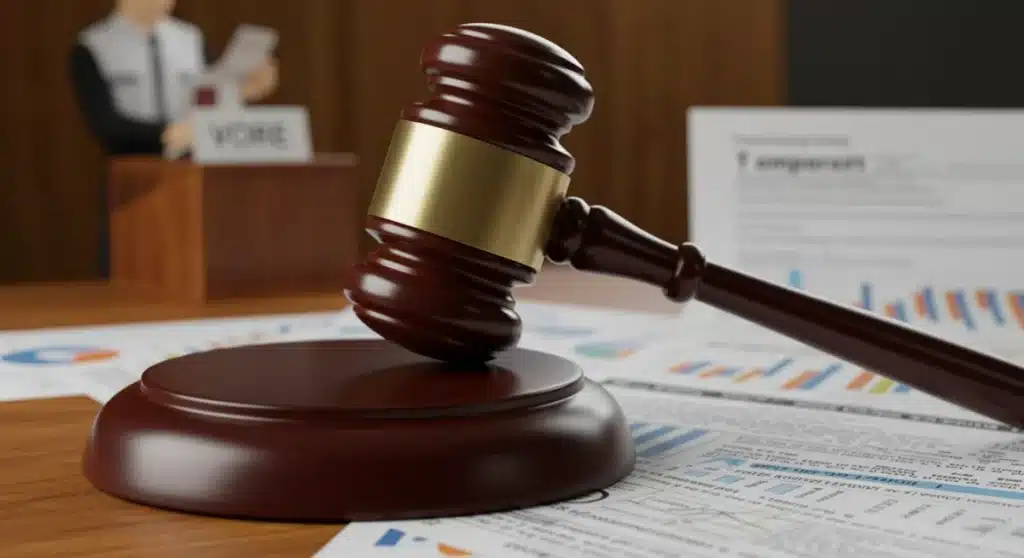
The proposed 15% corporate tax increase could significantly reshape campaign finance reform by altering the financial landscape for corporate political contributions and advocacy, potentially fostering a more level playing playing field in US elections.
What are the implications of the proposed 15% corporate tax increase on campaign finance reform?
The political landscape in the United States is perpetually shaped by policy debates, and few are as intricate and far-reaching as those concerning taxation and campaign finance. Currently, a significant proposal is on the table: a 15% corporate tax increase. This seemingly straightforward economic adjustment could, in fact, trigger a cascade of effects, profoundly influencing the ongoing discourse and practicalities of campaign finance reform. Understanding these potential implications is crucial for anyone interested in the future of American democracy and the role of money in politics.
The corporate tax increase: understanding the proposal
The idea of increasing the corporate tax rate to 15% is not merely an isolated fiscal adjustment; it represents a significant shift in economic policy with potential ripple effects across various sectors, including political funding. This proposal aims to ensure that corporations, particularly those with substantial profits, contribute a fairer share to the national economy, often citing reasons of fiscal responsibility and reducing income inequality.
Historically, corporate tax rates have fluctuated, with debates often centering on competitiveness and investment incentives. A 15% minimum tax, for instance, targets companies that might otherwise use various deductions and credits to pay little to no federal income tax. This move is projected to generate substantial revenue, which proponents argue could fund critical public services or reduce national debt. However, its broader impact extends beyond mere revenue generation, touching upon corporate behavior and their engagement in the political sphere.
Economic rationale behind the tax hike
The primary economic rationale for a corporate tax increase often revolves around enhancing government revenue and addressing perceived inequities in the tax system. Proponents argue that many large corporations, despite significant profits, manage to pay very low effective tax rates due to loopholes and aggressive tax planning. A minimum tax aims to close these gaps, ensuring a baseline contribution from profitable entities. This can lead to:
- Increased public funds for infrastructure, education, or healthcare.
- A fairer distribution of the tax burden across society.
- Reduced incentives for complex tax avoidance strategies.
Conversely, critics often raise concerns about the potential for such increases to stifle economic growth, reduce corporate competitiveness on a global scale, and ultimately harm consumers through higher prices or reduced investment. These arguments form the core of the ongoing economic debate surrounding the proposal, highlighting its multifaceted nature.
Historical context of corporate taxation and political influence
The relationship between corporate taxation and political influence has a long and complex history. Corporations, as significant economic actors, have always sought to influence policy decisions that affect their bottom line, including tax rates. Campaign contributions, lobbying efforts, and other forms of political spending are often deployed to achieve favorable legislative outcomes. Historically, periods of lower corporate taxes have sometimes coincided with increased corporate political spending, as companies allocate more resources to shape the regulatory environment.
Understanding this historical context is vital when analyzing the potential implications of a 15% corporate tax increase. If corporations face higher tax liabilities, their strategies for political engagement might evolve, potentially leading to shifts in how campaign finance operates. The proposal, therefore, isn’t just about tax revenue; it’s about recalibrating the balance of power between corporate interests and public policy.
In conclusion, the proposed 15% corporate tax increase is a policy initiative with deep economic roots and significant potential for broader societal impact. Its rationale stems from a desire for fiscal equity and increased public revenue, while its historical context underscores the intricate link between corporate taxation and political influence. This foundational understanding sets the stage for exploring its specific implications for campaign finance reform.
Direct financial impact on corporate political spending
A 15% corporate tax increase could directly impact the financial capacity of corporations, subsequently influencing their ability and willingness to engage in political spending. When a corporation’s tax burden rises, its net profits decrease, which can lead to a re-evaluation of discretionary expenditures, including political contributions and lobbying efforts. This financial constraint could manifest in several ways, altering the landscape of campaign finance.
First, companies might reduce their direct contributions to political campaigns, parties, and Super PACs. While these contributions are often seen as strategic investments, a tighter budget could force corporations to prioritize core business operations over political spending. Second, lobbying budgets could face scrutiny. Lobbying is an expensive endeavor, and a reduction in available funds might lead corporations to scale back their lobbying activities or focus them more narrowly on immediate threats or opportunities.
Reduced funds for direct contributions and Super PACs
A significant portion of corporate political influence comes from direct financial contributions. These include donations to individual candidates, political parties, and increasingly, to Super PACs and other independent expenditure groups. These groups can raise and spend unlimited amounts of money to support or oppose political candidates, as long as they do not coordinate directly with campaigns. The financial capacity of corporations directly underpins their ability to make these substantial contributions.
- Decreased corporate profits: With a higher tax rate, corporate profits decrease, leaving less disposable income for political donations.
- Strategic re-evaluation: Companies may re-evaluate the return on investment for political spending, potentially shifting resources away from less impactful contributions.
- Impact on Super PAC funding: Super PACs, heavily reliant on large corporate donations, could see a decline in funding, potentially weakening their influence in elections.
This reduction in available funds could lead to a less robust financial presence of corporations in electoral cycles, potentially diminishing their ability to shape narratives and support preferred candidates through substantial financial backing. The effect would be more pronounced for companies that currently rely heavily on tax loopholes to minimize their tax burden.
Changes in lobbying expenditures
Lobbying is another critical avenue through which corporations exert political influence. Companies spend billions annually to influence legislation and regulatory decisions. A corporate tax increase could directly affect these expenditures. When corporate revenues are reduced by higher taxes, the budget allocated for lobbying might be among the first areas to be cut or significantly re-evaluated.
Corporations might become more selective about their lobbying efforts, focusing only on issues directly critical to their survival or growth. This could mean a shift from broad-based lobbying campaigns to more targeted advocacy on specific pieces of legislation. Furthermore, smaller corporations or those with tighter margins might be forced to scale back their lobbying presence significantly, potentially ceding influence to larger, more financially robust entities or to other interest groups.
The overall impact would be a landscape where corporate lobbying, while still present, might be less pervasive and more concentrated on immediate business interests. This could, in turn, create opportunities for other voices to be heard more clearly in the legislative process.
In summary, the proposed 15% corporate tax increase is expected to have a tangible financial impact on corporate political spending. By reducing available funds for direct contributions and potentially curtailing lobbying expenditures, it could initiate a significant shift in how corporations engage with the political process, fostering a less financially driven form of influence.
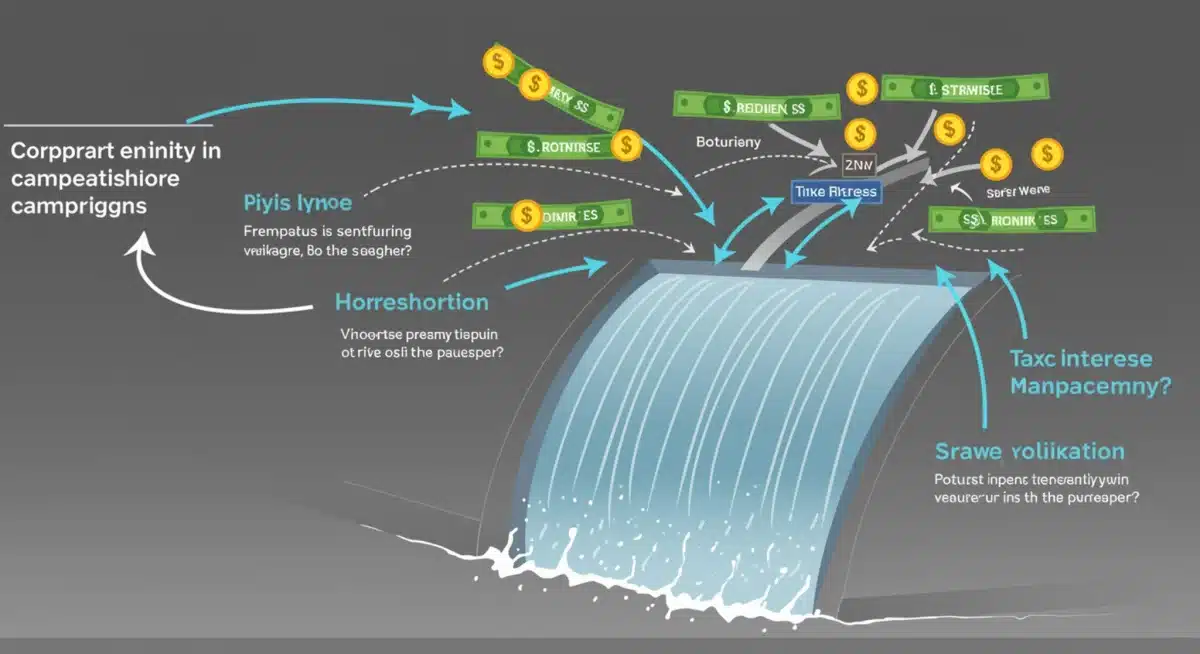
Shifting dynamics of political influence and advocacy
Beyond the direct financial implications, a corporate tax increase could fundamentally alter the dynamics of political influence and advocacy. When corporate financial power is potentially curtailed, other forms of influence might become more prominent, and the balance of power among various interest groups could shift. This could lead to a more diversified landscape of political advocacy, with new players gaining prominence.
The reduction in corporate financial leverage might create a vacuum that can be filled by other stakeholders. Labor unions, non-profit organizations, grassroots movements, and individual donors could find their voices amplified in a political environment where corporate money plays a less dominant role. This shift could lead to a more representative political discourse, reflecting a broader range of public interests rather than primarily corporate ones.
Empowerment of alternative funding sources
If corporate political spending diminishes, alternative funding sources could gain greater importance. This includes individual donors, small-dollar contributions, and issue-based advocacy groups that rely on membership dues or philanthropic grants rather than corporate backing. The empowerment of these alternative sources could lead to a more decentralized and democratized campaign finance system.
- Increased reliance on small-dollar donations: Campaigns might intensify efforts to solicit small contributions from a broader base of individual donors.
- Growth of grassroots movements: Organizations focused on specific social or environmental issues, often funded by individuals, could see their influence grow.
- Enhanced role for labor unions: Labor unions, traditionally significant political spenders, might find their contributions and advocacy more impactful in a less corporate-dominated environment.
This potential shift could encourage candidates to appeal to a wider segment of the electorate, rather than focusing primarily on securing large corporate donations. It could also empower issue-based advocacy, as groups with strong public support might find it easier to mobilize resources and influence policy.
Increased focus on grassroots organizing and public opinion
With potentially less corporate money directly influencing campaigns and lobbying, political actors might increasingly turn their attention to grassroots organizing and the cultivation of public opinion. This would involve a greater emphasis on direct voter engagement, community outreach, and persuasive communication to sway public sentiment.
Campaigns might invest more in digital organizing, social media outreach, and local community events to build support from the ground up. Lobbying efforts could also shift, focusing more on public relations and shaping public discourse to influence policymakers indirectly. This approach relies less on financial muscle and more on compelling arguments and community mobilization.
The implications for campaign finance reform are significant: it could foster a political environment where popular support and coherent policy arguments hold more sway than sheer financial power. This would align with the goals of many reform advocates who seek to reduce the perceived corrupting influence of money in politics.
In essence, a corporate tax increase could catalyze a redistribution of political influence. By potentially reducing the financial leverage of corporations, it could empower alternative funding sources and place a greater emphasis on grassroots organizing and public opinion, leading to a more diverse and arguably more democratic form of political advocacy.
Potential for increased transparency and accountability
One of the most significant arguments for campaign finance reform centers on the need for greater transparency and accountability in political spending. A corporate tax increase, by potentially altering the flow of corporate money into politics, could inadvertently foster an environment where these goals are more attainable. When the sources and uses of political funds become clearer, it becomes easier to identify potential conflicts of interest and hold both corporations and politicians accountable.
The current system often allows for complex pathways of corporate political spending, sometimes obscuring the ultimate origins of funds. If a tax increase prompts a re-evaluation of these spending habits, it might also lead to simpler, more direct forms of political engagement that are easier to track and regulate. This could be a significant step towards fulfilling the long-standing demands of campaign finance reformers.
Scrutiny of corporate political expenditures
A higher corporate tax rate could lead to increased public and regulatory scrutiny of how corporations spend their remaining profits, particularly on political activities. If companies are paying more in taxes, there might be greater public interest in ensuring that their political spending is ethical and transparent. This enhanced scrutiny could come from various sources:
- Shareholder activism: Shareholders, concerned about reduced profits due to higher taxes, might demand greater transparency and justification for political expenditures.
- Media investigations: Journalists might intensify their investigations into corporate political spending, seeking to uncover any attempts to influence policy disproportionately after a tax hike.
- Public interest groups: Advocacy groups dedicated to campaign finance reform could leverage the tax increase debate to push for stricter disclosure rules and limits on corporate political spending.
This heightened scrutiny could pressure corporations to be more judicious and transparent about their political involvement, potentially leading to a reduction in undisclosed or ‘dark money’ spending. The goal of campaign finance reform is often to shed light on these hidden financial flows, and a tax increase could provide an unexpected catalyst for this.
Impact on dark money and undisclosed spending
Dark money in politics refers to spending by groups that do not have to disclose their donors, allowing for significant sums to influence elections and policy debates without public knowledge of their origins. Corporate money often finds its way into politics through these channels, making it difficult to trace the true extent of corporate influence. A corporate tax increase could have a complex but potentially positive impact on this phenomenon.
If corporations have less discretionary income due to higher taxes, they might reduce their contributions to dark money groups. The perceived return on investment for such spending might diminish if the overall financial pool is smaller. Furthermore, increased public and regulatory scrutiny, as mentioned earlier, could make corporations more hesitant to engage in undisclosed spending, fearing reputational damage or legal repercussions.
While a tax increase alone might not eliminate dark money, it could contribute to a broader environment where transparency is increasingly valued and demanded. This would align perfectly with the objectives of campaign finance reform, which seeks to ensure that all political spending is visible to the public, fostering greater accountability.
In conclusion, a corporate tax increase has the potential to significantly enhance transparency and accountability in political spending. By drawing greater scrutiny to corporate expenditures and potentially reducing the flow of dark money, it could help achieve long-sought goals of campaign finance reform, leading to a more open and responsible political funding system.
Challenges and unintended consequences for reform
While a corporate tax increase presents several potential benefits for campaign finance reform, it is also important to acknowledge the challenges and unintended consequences that might arise. Policy changes rarely occur in a vacuum, and complex systems like campaign finance often react to new regulations in unforeseen ways. Understanding these potential pitfalls is crucial for developing comprehensive and effective reform strategies.
One primary concern is that corporations, facing higher tax burdens, might seek alternative, less transparent ways to exert influence. This could include increased spending on lobbying through trade associations, which often have less stringent disclosure requirements, or a shift towards issue advocacy that is harder to regulate. Another challenge lies in predicting the overall financial health of corporations and their ability to adapt to new tax regimes without severely impacting their political engagement.
Circumvention and new avenues of influence
A significant risk is that corporations, rather than reducing their political influence, might simply find new methods to exert it that are less directly tied to traditional campaign finance regulations. This phenomenon, often referred to as regulatory arbitrage, involves finding loopholes or alternative channels to achieve desired outcomes.
- Increased use of trade associations: Corporations might funnel more money through industry trade associations, which can lobby and engage in political advocacy on behalf of their members, often with less individual corporate disclosure.
- Issue advocacy and public relations campaigns: Instead of direct political contributions, companies might invest more in public relations campaigns and issue advocacy to shape public opinion and pressure policymakers indirectly. These activities are often not subject to the same campaign finance regulations.
- Dark money evolution: While a tax increase might reduce some dark money, it could also incentivize the creation of new, more complex dark money structures designed to obscure corporate funding.
These potential shifts highlight the adaptive nature of political spending. Any reform aiming to reduce corporate influence must anticipate and address these potential avenues of circumvention to be truly effective. The goal should be to close loopholes rather than inadvertently creating new ones.
Economic impact on corporate viability and political engagement
Another challenge is the potential economic impact of a 15% corporate tax increase on the viability of certain businesses, particularly smaller or medium-sized enterprises. While the proposal often targets large, highly profitable corporations, the broader economic environment it creates could affect a wider range of businesses.
If the tax increase leads to significant economic contraction or reduced corporate profitability across the board, it could have unintended consequences for political engagement. Some corporations might be forced to withdraw from political spending altogether, not as a strategic choice for reform, but as a necessity for survival. This could lead to a less diverse corporate voice in politics, potentially consolidating influence among the very largest and most resilient corporations.
Furthermore, if the tax increase is perceived as overly burdensome, it could lead to corporations investing less in domestic operations, potentially impacting job creation and economic growth. This broader economic impact, while not directly related to campaign finance, could create a less stable environment in which to pursue political reforms.
In conclusion, while a corporate tax increase offers promising avenues for campaign finance reform, it is not without its challenges. The potential for corporations to find new ways to exert influence and the broader economic impacts on corporate viability warrant careful consideration. Effective reform requires not just policy changes but also a foresight into how various actors will adapt to these new rules.
Public perception and political will for reform
The success of any campaign finance reform effort hinges not only on policy design but also on public perception and the political will to enact and sustain change. A proposed 15% corporate tax increase could significantly influence both these factors, either galvanizing support for reform or creating new points of contention. Understanding this interplay is crucial for assessing the long-term viability of reform efforts.
Public opinion often reflects a desire for a more equitable political system, less beholden to powerful corporate interests. If the tax increase is perceived as a step towards making corporations pay their fair share, it could strengthen public demand for further reforms in campaign finance. Conversely, if the tax increase is seen as economically damaging, it could undermine the political will to pursue related reforms, as policymakers might prioritize economic stability over political restructuring.
Shaping public opinion on corporate influence
The debate surrounding a corporate tax increase naturally brings corporate behavior and influence into the public spotlight. This increased visibility can significantly shape public opinion regarding the role of corporations in politics and the need for campaign finance reform. If the public perceives corporations as actively trying to avoid taxes while simultaneously spending heavily to influence policy, it could fuel calls for stricter regulations.
Public awareness campaigns and media coverage of the tax debate can highlight the connections between corporate profits, tax contributions, and political spending. This can lead to:
- Increased public demand for transparency: Citizens may demand to know more about how corporations spend their money politically, especially if they are seen as not contributing enough to public coffers.
- Stronger support for campaign finance limits: If corporate influence is viewed as excessive due to financial power, there might be greater public support for limits on corporate contributions and lobbying.
- Mobilization of advocacy groups: Public interest groups focused on good governance and campaign finance reform could use the tax debate as a platform to push their agendas more effectively.
Ultimately, a corporate tax increase could serve as a focal point for a broader discussion about corporate responsibility and the integrity of the democratic process, thus shaping public opinion in favor of reform.
Political feasibility and cross-party cooperation
The political feasibility of enacting campaign finance reform is often a complex issue, requiring a degree of cross-party cooperation that can be elusive. A corporate tax increase, being a politically charged topic itself, could either facilitate or hinder such cooperation, depending on how it is framed and debated.
On one hand, if the tax increase is seen as a bipartisan effort to create a fairer economic system, it could open doors for cooperation on related issues like campaign finance. Some lawmakers might see the two policies as complementary, aiming to reduce corporate influence both fiscally and politically. On the other hand, if the tax increase becomes a highly partisan issue, it could make it more difficult to achieve consensus on campaign finance reform, as political factions might become entrenched in their positions.
The ability of political leaders to articulate a clear vision that connects tax reform with campaign finance reform will be critical. If they can successfully argue that both are necessary components of a healthier democracy, it could build the political will required to overcome partisan divides and enact meaningful changes.
In summary, public perception and political will are vital components in the push for campaign finance reform. A corporate tax increase has the potential to significantly influence these factors by shaping public opinion on corporate influence and either fostering or hindering the political feasibility of cross-party cooperation, ultimately determining the trajectory of reform efforts.
Comparative analysis: international perspectives on corporate tax and campaign finance
Examining how other countries manage corporate taxation and campaign finance can provide valuable insights into the potential outcomes and best practices for the United States. While each nation has its unique political and economic context, a comparative analysis reveals various approaches and their respective implications. This global perspective can help policymakers anticipate challenges and design more effective reforms, particularly when considering a significant policy shift like a 15% corporate tax increase.
Many developed nations have different corporate tax structures and varying degrees of regulation over corporate political spending. Some countries have higher corporate tax rates coupled with strict limits on corporate donations, while others have more lenient approaches. Understanding these diverse models can inform the debate in the U.S. and help predict how a corporate tax hike might interact with existing campaign finance laws.
Lessons from other developed economies
Several developed economies offer models where corporate taxation and campaign finance regulations are intertwined, providing potential lessons for the U.S. For instance, some European countries have higher corporate tax rates and robust public funding mechanisms for political parties, which can reduce reliance on corporate donations. This often leads to a political landscape where corporate financial influence is less pervasive.
- Public funding of elections: Countries like Germany and Canada utilize public funds to support political parties and campaigns, thereby lessening the need for private, including corporate, contributions. This can create a more level playing field.
- Strict limits on corporate donations: Many nations impose stringent limits or outright bans on corporate and union donations to political parties and candidates, aiming to reduce undue influence.
- Comprehensive disclosure requirements: Several countries have more comprehensive disclosure rules for political spending, ensuring greater transparency regarding who funds political activities.
These examples suggest that a combination of higher corporate taxation and strong campaign finance regulations can contribute to a political system where corporate influence is more contained. The U.S. could draw inspiration from these models to complement its own tax reforms with enhanced campaign finance regulations.
Challenges of implementing global best practices in the US context
While international examples offer valuable insights, implementing global best practices in the U.S. context presents unique challenges. The American political system, with its emphasis on free speech and a long history of private funding in elections, differs significantly from many other democracies.
One major hurdle is the interpretation of the First Amendment, which has been used by courts to protect political spending as a form of free speech, making it difficult to enact certain types of restrictions on corporate contributions. Additionally, the fragmented nature of campaign finance regulation at federal, state, and local levels adds complexity. The strong lobbying presence of various industries also poses a significant barrier to reform efforts.
Therefore, while a 15% corporate tax increase might align the U.S. more closely with global tax norms, integrating international campaign finance best practices would require navigating these specific constitutional and political realities. A nuanced approach that respects American legal traditions while still achieving reform goals is essential.
In conclusion, a comparative analysis of corporate taxation and campaign finance globally underscores the diverse approaches to managing corporate influence in politics. While other developed economies offer valuable lessons in reducing corporate financial leverage, the unique challenges of the U.S. political system necessitate a tailored approach to implementing reforms. The proposed corporate tax increase could be a crucial first step, but it must be considered within this broader international and domestic context.
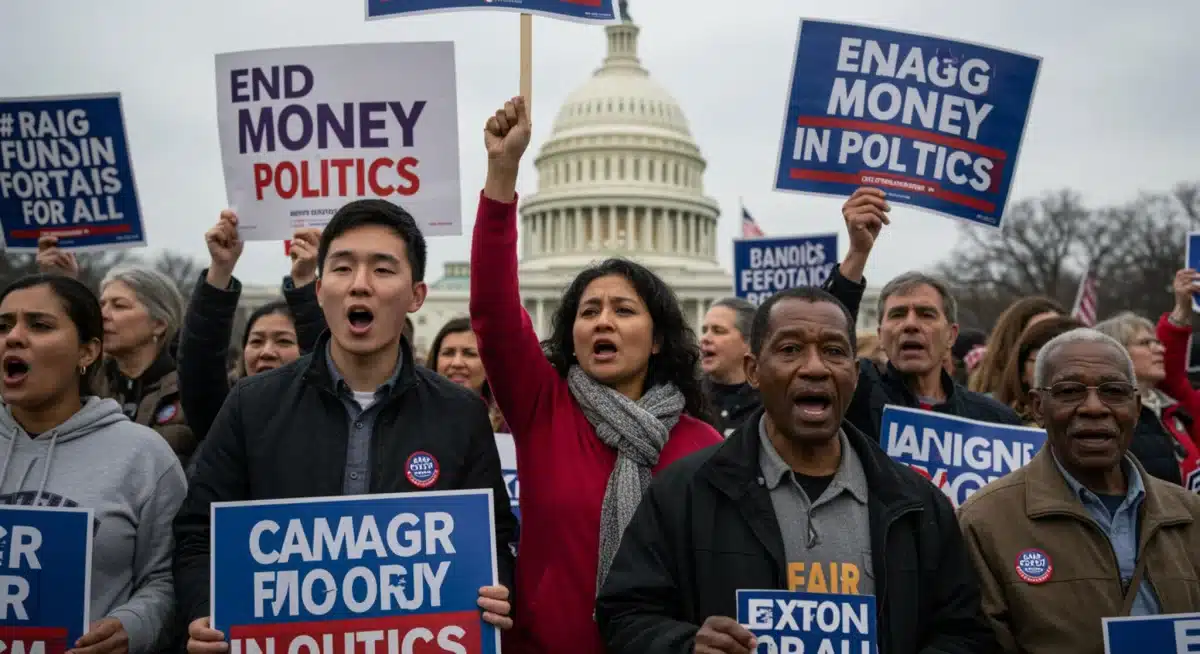
The future of campaign finance reform post-tax increase
Looking ahead, the proposed 15% corporate tax increase has the potential to be a pivotal moment for campaign finance reform, serving as a catalyst for further changes or, conversely, highlighting the enduring challenges. The future trajectory of reform will depend on a confluence of factors, including how corporations adapt, public reaction, and the political will of elected officials. It is unlikely to be a singular event but rather an ongoing evolution influenced by this significant fiscal policy shift.
The impact will not be immediate or universally positive for reform. Instead, it will likely initiate a period of adjustment where various stakeholders – corporations, political parties, advocacy groups, and the public – react to the new financial realities. This dynamic environment could either accelerate the movement towards a more equitable campaign finance system or reveal new complexities that require even more innovative solutions.
Long-term implications for corporate political engagement
In the long term, a sustained higher corporate tax rate could fundamentally reshape how corporations engage with the political process. Rather than simply reducing their financial contributions, companies might evolve their strategies to focus more on indirect influence, thought leadership, or building public goodwill. This could lead to a more sophisticated, albeit potentially less direct, form of corporate political engagement.
- Shift to non-financial influence: Corporations might invest more in research, policy development, and public relations to influence debates through intellectual capital and media presence rather than direct donations.
- Increased focus on corporate social responsibility: Companies might enhance their corporate social responsibility (CSR) initiatives to build public trust and goodwill, indirectly enhancing their political standing.
- Strategic alliances: Corporations might form more strategic alliances with non-profit organizations, academic institutions, or other industry groups to collectively advocate for their interests, pooling resources and influence.
These shifts would require campaign finance reformers to adapt their focus, moving beyond just tracking direct financial contributions to understanding the broader ecosystem of corporate influence. The goal would be to ensure that even indirect forms of influence remain transparent and accountable.
Policy recommendations for a more equitable system
To fully leverage the potential benefits of a corporate tax increase for campaign finance reform, policymakers should consider a range of complementary measures. These recommendations aim to create a more equitable and transparent political funding system, building upon the foundations laid by fiscal policy changes.
Firstly, strengthening disclosure requirements for all forms of political spending, including lobbying and dark money groups, is crucial. This would ensure that any shift in corporate influence towards less direct channels remains visible to the public. Secondly, exploring options for public financing of elections could further reduce the reliance on corporate and large individual donations, empowering more diverse candidates. Thirdly, implementing stricter enforcement mechanisms for existing campaign finance laws would ensure compliance and deter circumvention. Lastly, fostering a culture of ethical political engagement among corporations, perhaps through incentives for transparent practices, could complement regulatory efforts.
These policy recommendations, when combined with the financial implications of a corporate tax increase, could collectively move the United States closer to a campaign finance system that prioritizes public interest over private influence.
In conclusion, the proposed 15% corporate tax increase is poised to significantly influence the future of campaign finance reform. While it presents opportunities to reshape corporate political engagement and foster a more equitable system, its long-term impact will depend on proactive policy responses and a sustained commitment to transparency and accountability. The path forward involves not just fiscal adjustments but also comprehensive reforms that address the evolving nature of political influence.
| Key Impact Area | Brief Description |
|---|---|
| Corporate Spending | Potential reduction in direct contributions and lobbying due to decreased profits. |
| Influence Dynamics | Shift towards empowering alternative funding sources and grassroots movements. |
| Transparency | Increased scrutiny on corporate political expenditures and potential reduction in dark money. |
| Challenges | Risk of circumvention through new influence avenues and unintended economic impacts. |
Frequently asked questions
A 15% corporate tax increase could lead to reduced lobbying budgets as corporate profits decrease. Companies might become more selective, focusing efforts on critical issues, or shift to less direct forms of advocacy, potentially impacting the overall volume and nature of corporate lobbying in Washington.
Yes, potentially. Higher taxes could prompt increased public and shareholder scrutiny of corporate political expenditures. This heightened oversight might pressure companies to be more transparent about their political contributions and lobbying, possibly reducing the use of ‘dark money’ channels in the long run.
If corporate financial influence diminishes, there’s a strong possibility that small-dollar donors and grassroots movements could gain more prominence. Campaigns might increasingly rely on broader individual contributions and community mobilization, fostering a more decentralized political funding landscape.
Key challenges include corporations finding new, less transparent avenues for influence, such as through trade associations or issue advocacy. There’s also the risk of unintended economic consequences impacting corporate viability, which could complicate broader reform efforts or create new loopholes.
Yes, many developed economies employ higher corporate tax rates alongside strict limits on political donations or public funding of elections. These models suggest that a combination of fiscal and regulatory measures can effectively reduce corporate financial influence, offering lessons for the U.S.
Conclusion
The proposed 15% corporate tax increase stands as a significant policy initiative with far-reaching implications, particularly for the intricate world of campaign finance reform. While primarily an economic measure, its ripple effects could fundamentally alter the landscape of political influence in the United States. By potentially reducing corporate financial leverage, it opens avenues for greater transparency, empowers alternative funding sources, and shifts the focus towards grassroots organizing and public opinion. However, the path to reform is fraught with challenges, including the potential for corporations to find new avenues of influence and the complex interplay with broader economic conditions. Ultimately, the success of leveraging this tax change for meaningful campaign finance reform will depend on a proactive and comprehensive approach by policymakers, one that integrates fiscal adjustments with robust regulatory frameworks and a sustained commitment to a more equitable and transparent democratic process.

